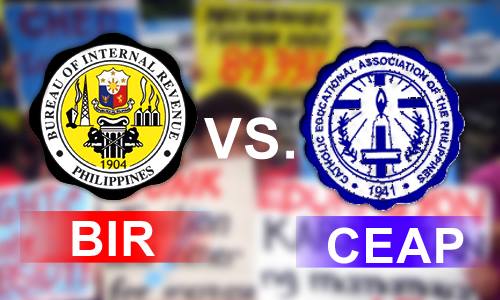By MART D. SAMBALUD
Davao Today
DAVAO CITY — Private Catholic school owners want the Bureau of Internal Revenue (BIR) to scrap a new policy requiring them to file annual income reports before they are issued tax exemptions.
The Catholic Educational Association of the Philippines (CEAP), which comprised of 1,219 Catholic schools nationwide, said the ruling violated the tax-exemption status of religious and educational institutions under the Constitution and the National Internal Revenue Code.
The BIR issued Revenue Memorandum Order (RMO) No. 20-2013 last July 22 requiring all private schools to apply for a tax exemption starting January 2014 “to ensure compliance with the conditions attached to the tax exemption and minimize tax leakages arising from inaccurate interpretation of relevant tax laws and administrative issuances.”
This new rule requires all non-stock and non-profit (NSNP) educational institutions to submit additional requirements such as the original copy of certificate of utilization of annual revenues and assets of the institutions.
The order said tax immunity granted to schools have been revoked as of January 1this year, as tax exemption rulings or certificates of schools listed under section 30 of the National Income Revenue Code issued prior to June 30, 2012 remained valid until December 31, 2013.
But CEAP Vice President Fr. Joel E. Tabora, S.J., President of Ateneo de Davao University (AdDu) told Davao Today that the order “imposes an additional, unreasonable, and unnecessary burden upon NSNP religious and educational institutions other than what is expressly stated in the law.”
“The issuance of RMO No. 20-2013 violates the CEAP member-schools’ right to due process since the said order issued without due notice to the member-Schools sans public hearing on the matter covered by the RMO,” Tabora said.
CEAP has written a position paper last September requesting for exemptions.
BIR Commissioner Kim Henares, quoted in a news report, said the “additional documentary requirements for pre-evaluation by the Revenue District Officers (RDOs) are stringent with emphasis that non-profit and non-stock educational institutions should be organized and operated exclusively for the purposes they are created.”
But Sr. Ma Domitilla B. Sendino, OP, Principal of Maryknoll High School of Lupon and Education Head of Dominican (Holy Rosary) schools in Davao Region, said “the order transformed what should have been a mere factual examination of religious schools into an administrative approval process backed up with the threat of disqualification from their present tax-exempt status.”
Under Section 28(3), Article VI, Constitution, charitable institutions, churches and parsonages or convents appurtenant thereto, mosques, nonprofit cemeteries, and all lands, buildings, and improvements, actually, directly, and exclusively used for religious, charitable, or educational purposes shall be exempt from taxation.
“We are certain that all income derived from legitimate operations of our member-schools are reinvested and used to organized actually, directly, and exclusively for educational purposes,” Tabora stressed.
However, income from properties or from any of their activities conducted for profit shall be subject to tax.
The BIR has been aggressively pursuing the financial and tax records of individuals and institutions.
The move to tax schools also brings up the issue of private schools charging high tuition fees from students, which has been a burden for parents.
Tuition fees have been increasing around 8 to 10% on the average in the past twenty years. (Mart D. Sambalud/davaotoday.com)











